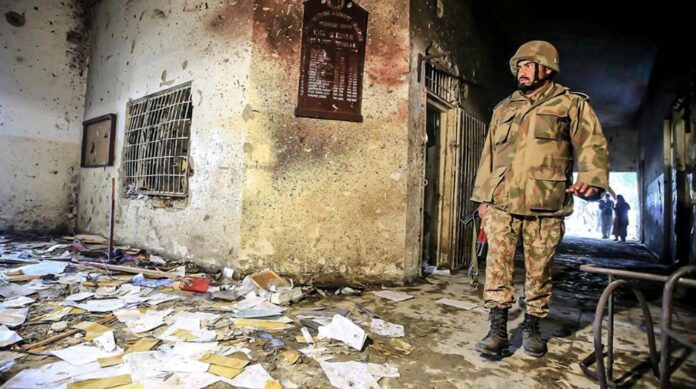SC Questions Government on APS Attack Not Being Tried in Military Court Under Army Act
The Supreme Court’s constitutional bench on Wednesday questioned the government over the decision not to try the Army Public School (APS) attack case in a military court, despite the existence of the Army Act and its relevance to the crime.
During the hearing of appeals against the trial of civilians in military courts, the bench also inquired why a constitutional amendment was deemed necessary to prosecute terrorism cases in military courts.
The hearing, presided over by Justice Amin-Ud-Din Khan and featuring Khawaja Haris representing the Ministry of Defence, revolved around the applicability of military courts.
Haris explained that the nature of a crime determines the jurisdiction, stating that crimes involving civilians linked to the armed forces would be tried in military courts.
Justice Jamal Mandokhail asked whether the intent behind such crimes — specifically if they targeted national interests — should also be considered. He also raised concerns about why cases related to attacks on the General Headquarters (GHQ) and Karachi airbase were not tried in military courts.
The defence ministry’s counsel referred to the 21st Amendment case, which addressed attacks on GHQ, airbases, military installations, and places of worship. He clarified that the Army Act specifies that crimes related to the military fall under military court jurisdiction.
Justice Mandokhail further questioned whether intent is assessed in cases under the Army Act. Justice Amin responded that intent could be argued as a defence during the trial, while Justice Muhammad Ali Mazhar noted that intent is examined during proceedings.
Haris confirmed that the APS attack had links to the military, as one aspect involved an army officer and another related to military connections. Justice Mandokhail questioned why the APS attack was not tried in a military court despite these links and the Army Act’s applicability at the time. He also queried why a constitutional amendment was needed for terrorism trials in military courts.
In response, Haris explained that the amendment expanded the scope of crimes addressed, including those unrelated to discipline and duties. He added that terrorist acts linked to organizations or religion could be tried in military courts without constitutional amendments, provided they fall under the Army Act.
The hearing was adjourned until Thursday (tomorrow).
The APS attack, carried out on December 16, 2014, remains one of Pakistan’s most horrific terrorist incidents, claiming the lives of 147 people, most of whom were schoolchildren.




